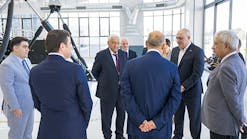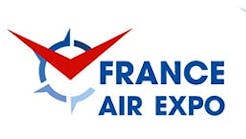Johnson College Announces 2-Year Associate's Degree in Aviation Technology
Mar. 24—PITTSTON TWP. — Dr. Katie Leonard, Johnson College's President and CEO, Thursday said the aviation technology industry expects rapid-paced growth within the next decade.
"Johnson College is prepared to meet that demand by offering our students hands-on experience and training on campus and at in-field labs, giving them an advantage to succeed in this in-demand industry," Leonard said.
At a news conference Thursday in a hangar at the Wilkes-Barre/Scranton International Airport, Johnson College announced it has partnered with the airport to offer a two-year aviation technology associate's degree program scheduled to begin this fall.
The program hopes to address a local and nationwide shortage in aviation maintenance positions.
Students can now enroll in Johnson College's new two-year aviation technology associate's degree program, scheduled to begin with the Fall 2023 semester. Leonard said this will be the only program of its kind in the region.
Through a partnership with the Wilkes-Barre/Scranton International Airport (AVP), students will complete airframe and power plant instruction in a lab located at the airport, pending approval by the Middle States Commission on Higher Education. This opportunity will provide students with a very unique and hands-on learning experience in industry.
"We're excited to have this new partnership with Johnson College," said Carl Beardsley, AVP Executive Director. "This new degree program will greatly benefit the aviation industry, and we support Johnson College in its efforts to meet the demand in these fields in the world of aviation."
The aviation technology program prepares students as entry-level technicians with the latest information on diagnosis, repair procedures, preventative maintenance, and necessary safety application in aviation technology.
The program will provide students with the knowledge and skills outlined in the Federal Aviation Administration's ( FAA) Mechanics Airman Certification Standard (ACS) in preparation for the FAA licensure exam for general, airframe, and powerplant knowledge.
Students within this program will be prepared for careers in the aviation technology industry as aircraft mechanics, airframe mechanics, aviation technicians, aircraft specialists, and similar roles. Per the Bureau of Labor Statistics, the aviation technology field has a 6% growth potential through 2031. Graduates have the opportunity to earn a median annual income of up to $65,550.
Johnson College has received a three-year Advanced Technological Education grant for $307,706 from the National Science Foundation to support the aviation technology program.
For more information about or to enroll in this program, contact Johnson College's Enrollment Department at 570-702-8856 or [email protected].
Leonard said Johnson College is the region's only two-year technical college based in Scranton.
"I like to say that we are founded and grounded in industry," she said. "When students walk through the doors and enter this hangar, they will experience real-world, hands-on learning in a supportive environment. Our goal is always to help our students succeed in their chosen field."
Leonard thanked Beardsley and his team who worked with Johnson College "to get this program off the ground, if you know what I mean?"
The airport's Bi-County Airport Board attended the news conference: Tim McGinley, Luzerne County Council and Airport Board Chairman; Chris Chermak, Lackawanna County Commissioner, Airport Board Vice-Chairman; Debi Domenick, Esq., Lackawanna County Commissioner; Lee Ann McDermott, Luzerne County Council; Jerry Notarianni, Lackawanna County Commissioner; and Brian Swetz, Acting Luzerne County Manager.
Bill Burke, Johnson College's Vice President of Enrollment and Student Affairs, said the aviation technology program will prepare students as entry-level technicians with the latest information on diagnosis, repair procedures, preventive maintenance, and necessary safety applications in aviation technology.
"Students will gain an understanding of aircraft structures, systems, engines, finishes, materials, components, procedures, and operation," Burke said. "Graduates will be able to work as aircraft maintenance technicians, aircraft mechanics, aircraft restorers, airframe and powerplant mechanics, helicopter mechanic or similar roles in the aviation industry."
They will have the opportunity to make a median annual income of more than $65,000.
Burke said the new program is led by its Program Director Ryan Stephens, who has been a pilot for over 12 years and owns and operates a Cessna 172 and an aerobatic bi-plane. He's used his mechanical engineering technology degree from Penn State to work in various fields, including as an airframe, powerplant mechanic at Valley Aviation in Forty Fort since 2011. Throughout his engineering career he has been awarded multiple patents.
Bi- County Board meeting
Beardsley reported that passenger enplanements for the month of February 2023 increased 3% to 12,038, from 11,686 in the month of February 2022.
In February 2023, Beardsley said one departing flight was cancelled due to weather. Also, three arriving flights were cancelled due to weather.
Two airport employees were honored for their service: Mike Sobolewski, 35 years; and Jim McDermott, 15 years.
The board approved the promotion of Michelle Aigledinger to assistant to finance/administration.
Reach Bill O'Boyle at 570-991-6118 or on Twitter @TLBillOBoyle.
___
(c)2023 The Times Leader (Wilkes-Barre, Pa.)
Visit The Times Leader (Wilkes-Barre, Pa.) at www.timesleader.com
Distributed by Tribune Content Agency, LLC.




